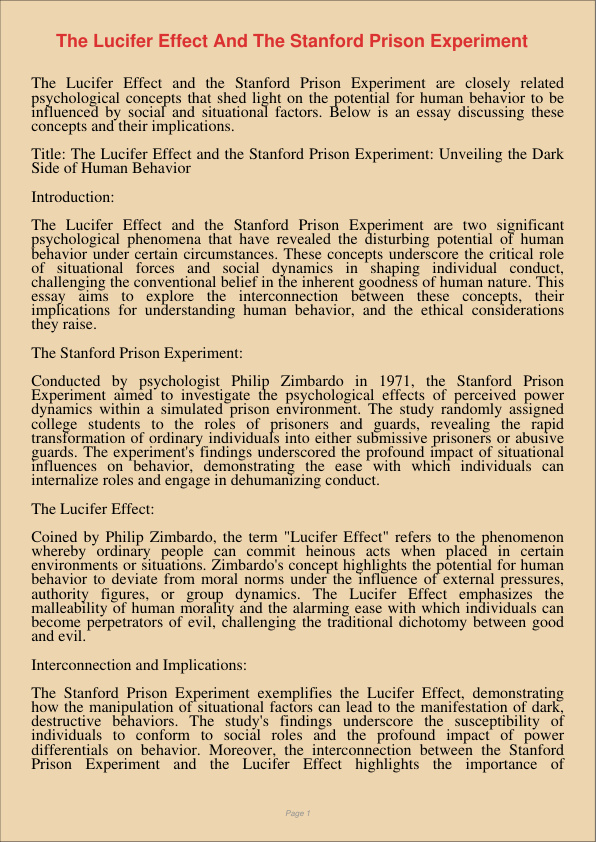The Lucifer Effect And The Stanford Prison Experiment
Dec 31, 2023
stanford prison experiment
lucifer effect
Engineering and Construction
Visual Arts & Film Studies
The Lucifer Effect and the Stanford Prison Experiment are closely related psychological concepts that shed light on the potential for human behavior to be influenced by social and situational factors. Below is an essay discussing these concepts and their implications.
Title: The Lucifer Effect and the Stanford Prison Experiment: Unveiling the Dark Side of Human Behavior
Introduction:
The Lucifer Effect and the Stanford Prison Experiment are two significant psychological phenomena that have revealed the disturbing potential of human behavior under certain circumstances. These concepts underscore the critical role of situational forces and social dynamics in shaping individual conduct, challenging the conventional belief in the inherent goodness of human nature. This essay aims to explore the interconnection between these concepts, their implications for understanding human behavior, and the ethical considerations they raise.
The Stanford Prison Experiment:
Conducted by psychologist Philip Zimbardo in 1971, the Stanford Prison Experiment aimed to investigate the psychological effects of perceived power dynamics within a simulated prison environment. The study randomly assigned college students to the roles of prisoners and guards, revealing the rapid transformation of ordinary individuals into either submissive prisoners or abusive guards. The experiment’s findings underscored the profound impact of situational influences on behavior, demonstrating the ease with which individuals can internalize roles and engage in dehumanizing conduct.
The Lucifer Effect:
Coined by Philip Zimbardo, the term “Lucifer Effect” refers to the phenomenon whereby ordinary people can commit heinous acts when placed in certain environments or situations. Zimbardo’s concept highlights the potential for human behavior to deviate from moral norms under the influence of external pressures, authority figures, or group dynamics. The Lucifer Effect emphasizes the malleability of human morality and the alarming ease with which individuals can become perpetrators of evil, challenging the traditional dichotomy between good and evil.
Interconnection and Implications:
The Stanford Prison Experiment exemplifies the Lucifer Effect, demonstrating how the manipulation of situational factors can lead to the manifestation of dark, destructive behaviors. The study’s findings underscore the susceptibility of individuals to conform to social roles and the profound impact of power differentials on behavior. Moreover, the interconnection between the Stanford Prison Experiment and the Lucifer Effect highlights the importance of understanding the complex interplay between individual agency and contextual influences, emphasizing the need to critically assess the ethical implications of conducting research that involves the manipulation of human behavior.
Ethical Considerations:
The ethical implications of the Stanford Prison Experiment and the Lucifer Effect are significant. The study raised concerns about the psychological harm inflicted on participants and the ethical boundaries of research that involves the manipulation of human behavior. The revelation of the potential for ordinary individuals to engage in abusive and dehumanizing conduct poses ethical dilemmas for researchers and society at large, emphasizing the need for stringent ethical guidelines to protect participants and prevent the replication of harmful experimental conditions.
Conclusion:
The Lucifer Effect and the Stanford Prison Experiment serve as cautionary tales, highlighting the susceptibility of human behavior to situational influences and the potential for ordinary individuals to perpetrate acts of cruelty under specific conditions. These concepts emphasize the necessity of cultivating ethical awareness and fostering a deeper understanding of the complexities of human behavior. By acknowledging the profound impact of environmental factors on individual conduct, we can strive to create societal structures that promote empathy, compassion, and ethical responsibility, ultimately fostering a more humane and just world.
